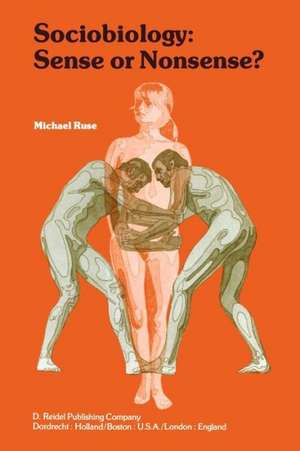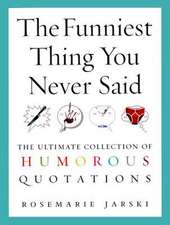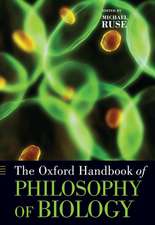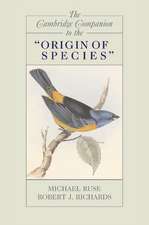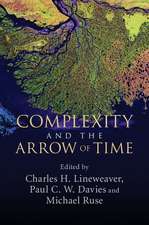Sociobiology: Sense or Nonsense?
Autor Michael Ruseen Limba Engleză Paperback – 15 mar 1979
| Toate formatele și edițiile | Preț | Express |
|---|---|---|
| Paperback (2) | 384.70 lei 6-8 săpt. | |
| SPRINGER NETHERLANDS – 15 mar 1979 | 384.70 lei 6-8 săpt. | |
| SPRINGER NETHERLANDS – 13 noi 2013 | 385.47 lei 6-8 săpt. |
Preț: 384.70 lei
Nou
Puncte Express: 577
Preț estimativ în valută:
73.61€ • 80.28$ • 62.07£
73.61€ • 80.28$ • 62.07£
Carte tipărită la comandă
Livrare economică 24 aprilie-08 mai
Preluare comenzi: 021 569.72.76
Specificații
ISBN-13: 9789027709400
ISBN-10: 9027709408
Pagini: 248
Ilustrații: XIV, 232 p.
Dimensiuni: 152 x 229 x 13 mm
Greutate: 0.34 kg
Ediția:Softcover reprint of the original 1st ed. 1979
Editura: SPRINGER NETHERLANDS
Colecția Springer
Locul publicării:Dordrecht, Netherlands
ISBN-10: 9027709408
Pagini: 248
Ilustrații: XIV, 232 p.
Dimensiuni: 152 x 229 x 13 mm
Greutate: 0.34 kg
Ediția:Softcover reprint of the original 1st ed. 1979
Editura: SPRINGER NETHERLANDS
Colecția Springer
Locul publicării:Dordrecht, Netherlands
Public țintă
ResearchCuprins
1. Introduction.- Notes to Chapter 1.- 2. The Biological Background.- 2.1. Sociobiology as Biology.- 2.2. Principles of Genetics.- 2.3. Population Genetics.- 2.4. Selection as Preserver of the Status Quo.- 2.5. The Level of Selection.- 2.6. The Theory of Evolution.- 2.7. Sociobiology as part of Evolutionary Theory.- Notes to Chapter 2.- 3. The Sociobiology Of Animals.- 3.1. Aggression: The Ethological Viewpoint.- 3.2. What is Animal Aggression Really Like?.- 3.3. Evolutionary Stable Strategies.- 3.4. Strengths and Limitations of the Game-theoretic Approach.- 3.5. Sex and Sexual Selection.- 3.6. Parental Investment.- 3.7. Female Reproductive Strategies.- 3.8. Parenthood.- 3.9. Altruism.- 3.10. Kin Selection.- 3.11. Parental Manipulation.- 3.12. Reciprocal Altruism.- Notes to Chapter 3.- 4. Human Sociobiology.- 4.1. Aggression.- 4.2. Sex.- 4.3. Parenthood.- 4.4. Kin Selection.- 4.5. Parental Manipulation.- 4.6. Reciprocal Altruism.- 4.7. A General Model for Human Altruism.- Notes to Chapter 4.- 5. Normative Criticisms.- 5.1. Sociobiology as Reactionary.- 5.2. Does Sociobiology Support Virulent Capitalism?.- 5.3. Why Sahlins’ Criticisms About Ideology Fail.- 5.4. Sociobiological Explanations of Homosexuality.- 5.5. Is Sociobiology Sexist? The Minor Charges.- 5.6. Is Sociobiology Sexist? The Major Charge.- Notes to Chapter 5.- 6. Epistemological Criticisms.- 6.1. The Problem of Reification.- 6.2. Sociobiology as Mystical Nonsense.- 6.3. Natural Selection as Social Exploitation.- 6.4. Is Sociobiology Unfalsifiable? General Considerations.- 6.5. Is Sociobiology Unfalsifiable? Particular Considerations.- 6.6. Is Human Sociobiology False? The Rise and Fall of Islam.- 6.7. Is Human Sociobiology False? The Problem of Daughters.- 6.8. Conclusion.- Notes to Chapter 6.- 7. ThePositive Evidence.- 7.1. The Direct Evidence: Problems with Testing.- 7.2. Successes and Reservations.- 7.3. The Question of Intelligence.- 7.4. The Causes Behind Intelligence.- 7.5. The Weight of the Direct Evidence for Human Sociobiology.- 7.6. The Argument from Analogy.- 7.7. Human Aggression.- 7.8. The Indirect Evidence for Animal Sociobiology.- 7.9. The Indirect Evidence for Human Sociobiology.- 7.10. The Plausibility of Cultural Causes over Biological Causes.- 7.11. Does Culture Leave a Place for Human Sociobiology?.- 7.12. A Biological-Cultural Compromise.- 7.13. Conclusion.- Notes to Chapter 7.- 8. Sociobiology And The Social Sciences.- 8.1. Theory Change: Replacement and Reduction.- 8.2. The Replacement of Anthropology.- 8.3. Primitive War as Analysed through a Biological-Anthropological Compromise.- 8.4. Biologically Sympathetic Anthropology.- 8.5. The Formal Relationship between a Corrected Anthropology and Biology.- 8.6. Psychology: The Problem of Learning.- 8.7. Psychoanalytic Theory and the Explanation of Homosexuality.- 8.8. Economics.- 8.9. Sociology.- 8.10. Conclusion.- Notes to Chapter 8.- 9. Sociobiology And Ethics.- 9.1. Why are we Ethical?.- 9.2. Evolutionary Ethics.- 9.3. Wilson’s Attack on Intuitionism.- 9.4. Wilson’s Moral Relativism.- 9.5. Can Evolution be Directed?.- 9.6. Sociobiology and the Direction of Evolution.- 9.7. Conclusion.- Name Index.
